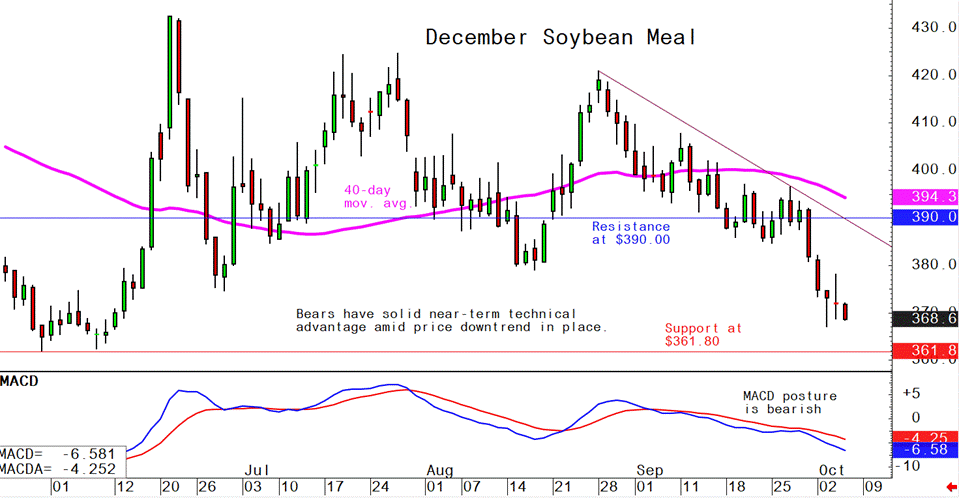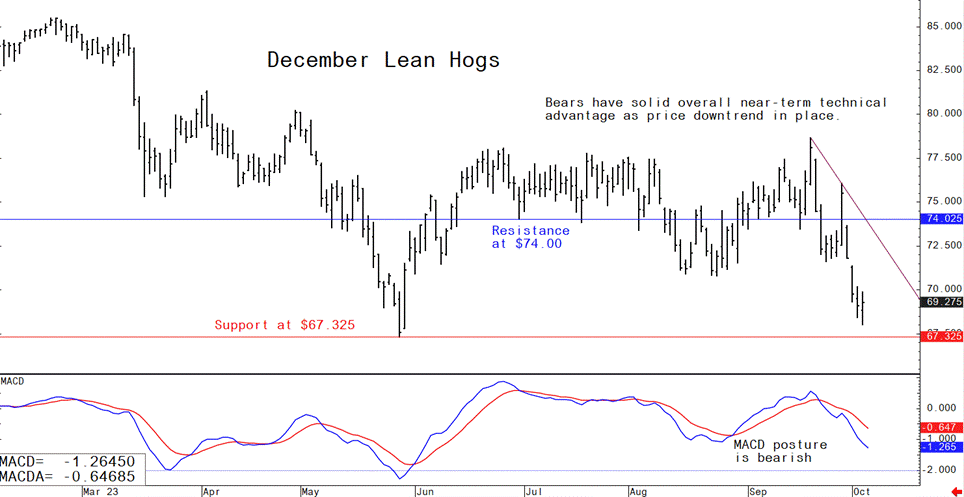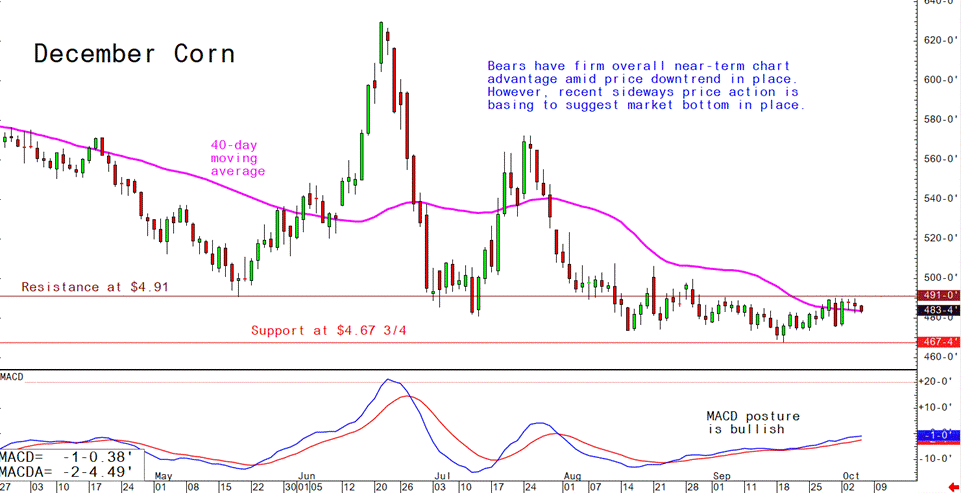



Pig outlook: Lean hog bears flexing their muscles, China's sow herd, gene editing
Livestock analyst Jim Wyckoff shares swine news from around the worldThe December lean hog futures market is presently in a steep price downtrend on the daily bar chart and this week hit a four-month low. Bears have the solid near-term technical advantage. That means the present path of least resistance for prices is sideways to lower. The latest CME lean hog index is down 29 cents to $84.55 (as of Oct. 2). The preliminary calculation for Thursday puts the index down an additional 27 cents to $84.28. While the seasonal pork market strength after Labor Day has come to an end, the relatively small drops in the CME index are less than many traders expected. High beef prices at the meat counter may put a floor under the pork market, on substitution demand in the coming weeks.
Weekly USDA US pork export sales
Net sales of 43,000 MT for 2023 were up 57 percent from the previous week and 61 percent from the prior 4-week average. Increases were primarily for Mexico (14,600 MT, including decreases of 300 MT), China (9,400 MT, including decreases of 100 MT), South Korea (4,400 MT, including decreases of 200 MT), Japan (3,400 MT, including decreases of 200 MT), and Australia (2,600 MT). Net sales reductions of 100 MT for 2024 were reported for Japan. Exports of 28,300 MT were down 6 percent from the previous week, but up 6 percent from the prior 4-week average. The destinations were primarily to Mexico (11,700 MT), Japan (3,300 MT), China (3,000 MT), South Korea (2,400 MT), and Canada (2,000 MT).
China’s sow herd declines
China’s sow herd totaled 42.41 million head at the end of August, according to the country’s ag ministry, down 0.7% from July and 1.9% smaller than last year. Hog slaughter surged 22.1% from year-ago in August.
USDA expects Canadian swine herd to contract in 2024
The Canadian swine herd is forecast to contract in 2024 as a result of reductions in slaughter capacity in Quebec and a reduced sow herd, according to a recent US Department of Agriculture (USDA) Global Agricultural Information Network (GAIN) report. Production declines will be most significant in Eastern Canada as the result of the closure of an Olymel slaughter plant as the company cuts production levels. The pig crop is forecast to decline slightly on smaller sow numbers, but fertility will be slightly higher as Ontario recovers from 2023 PEDv issues. Live exports to the United States will be reduced as producers make adjustments to the reductions in slaughter capacity. Expanding sow processing in Western Canada will increase sow slaughter numbers and a reduction in cull sow exports. However, sow processing relative to cull sow volumes will remain limited, and the United States will remain integral for processing Canadian cull sows. Weanling trade will also decline with the smaller pig crop. Pork production in 2024 is forecast to lower slightly from 2023 as the closure of the Olymel plant concludes at the end of December 2023. Pork exports will be further reduced from 2024 on lowered production and sustained domestic demand.
EU policymakers look to US gene-editing expertise
Jon Oatley, a Washington State University professor in the School of Molecular Biosciences, was invited by the US Embassy in Romania to speak about his research into gene-editing livestock. But most of the questions the European policy makers asked had to do with public acceptance of the technology. Oatley led the research team that developed “surrogate sires,” a gene-editing method which can help disseminate desirable and needed traits in livestock, such as better heat resilience. The technology promises to vastly improve protein sources to help feed the world’s growing population — but only if people will eat the meat from gene-edited animals. Read more.
Judge dismisses lawsuit against McDonald's and Wendy's over hamburger size advertising
A U.S. District Judge, Hector Gonzalez, has delivered a victory for the fast-food industry by dismissing a lawsuit that accused both McDonald's and Wendy's of deceptive advertising regarding the size of their hamburgers. The judge's ruling stemmed from a lack of evidence demonstrating that the fast-food chains had provided smaller burgers than advertised or that the plaintiff had encountered advertisements for the McDonald's Big Mac and Wendy's Bourbon Bacon Cheeseburger, which were central to the lawsuit. This favorable outcome is expected to strengthen the legal position of other fast-food chains, including Yum! Brands' Taco Bell and Restaurant Brands' Burger King, which are currently facing similar lawsuits.
Mexico reports H5N1 bird flu in wild duck
On the disease front, a case of H5N1 avian influenza was found in a “clinically healthy” migratory duck in the state of Jalisco, animal safety agency Senasica, which is part of Mexico’s ag ministry, said. This case does not indicate the occurrence of a highly pathogenic avian influenza (HPAI) outbreak. The announcement coincides with the Mexican government’s official statement that the country has been declared H5N1 free following the initiation of a vaccination campaign in high-risk areas. Senasica has clarified that the presence of H5N1 in a wild bird does not contradict the government’s declaration of being H5N1 free, and no cases have been identified in commercial poultry as of now.
The next week’s likely high-low price trading ranges:
December lean hog futures--$67.325 to $74.00 and with a sideways-lower bias
December soybean meal futures--$361.80 to $385.00, and with a sideways-lower bias
December corn futures--$4.67 3/4 to $4.95 and a sideways bias
Latest analytical daily charts lean hog, soybean meal and corn futures










